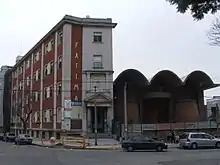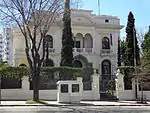Pocitos
Pocitos is an upscale seaside barrio of Montevideo, Uruguay. It borders Buceo to the east, Parque Batlle to the north, Tres Cruces, Cordón and Parque Rodó to the west and Punta Carretas to the south.
- Pocitos is also the colloquial name for the city of Salvador Mazza, Salta Province, Argentina
Pocitos | |
|---|---|
Pocitos Beach Spain Boulevard Public School No. 17 Russian Embassy Montevideo Sign Pocitos Beach in Montevideo | |
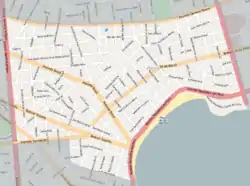 Street map of Pocitos | |
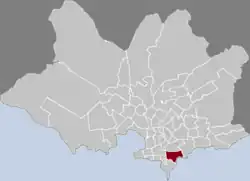 Location of Pocitos in Montevideo | |
| Coordinates: 34°54′30″S 56°9′0″W | |
| Country | |
| Department | Montevideo Department |
| City | Montevideo |
Pocitos is politically included in the CH Municipality of Montevideo, and located along the banks of the Rio de la Plata, it is one of the most famous beaches in the city.[1] The neighborhood is an affluent area of the city, characterized by the presence of high-rise apartment buildings facing the Rambla and the main boulevards, together with old neoclassical and eclectic mansions.[2]
History
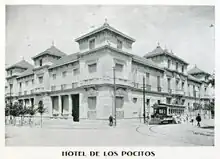
The neighborhood emerged as a seaside resort in the 19th century, but it was formally inaugurated in 1886, under the name of Nuestra Señora de los Pocitos.[3] The name is due to the habit of washerwomen going to the beach to wash their clothes, for which they made wells (Spanish: Pozos) in the clean sand.[4] Initially it was an independent town from the city, but over time it was absorbed with the urban expansion of Montevideo.[5]
In 1906, a tram line was inaugurated that connected the Customs House in the Ciudad Vieja with Pocitos.[6] This increased the popularity of the area, which became more accessible to the inhabitants of the downtown area of the city. In addition, the eclectic-style Gran Hotel Pocitos was built, which was a symbol of social status at the time.[7] The building was partially destroyed due to a storm in 1923 and years later it closed permanently.[8]
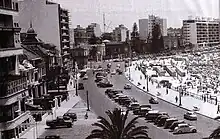
In the 1920s and 1930s it became a residential area, due to the construction of a large number of private residences of European architecture. In 1921 a multipurpose stadium was built in the area, which was one of the venues of the first FIFA World Cup held in 1930, and site of the first goal in World Cup history.[9] In the following years there was a great real estate development, and by the 1950s, Pocitos already surpassed Centro in number of apartment buildings.[10]
Pocitos increased its population to a great extent, ranking as one of the districts with the highest population density and highest real estate prices.[11]
Pocitos Beach

Pocitos Beach is located on the coast of the Río de la Plata, an area with waters with a high level of salinity and waves.[12] It is a very crowded beach during the summer season, as it is popular for sports. In the eastern zone stands the Arenas del Plata Stadium, a venue for beach sports for more than 2,500 spectators.[13] The Pocitos Rambla is 2 kilometers long, and on it are yacht clubs and restaurants.[14]
Landmarks
Pocitos is connected to the central business district by Spain Boulevard and Brazil Avenue.[15] On them are located a large number of architecturally notable buildings that combine different styles, such as eclecticism and neoclassical.[16] In turn, many embassies are located in the area, in old mansions from the late 19th century and early 20th century.[17]
Some buildings declared National Historic Monuments by the Ministry of Education and Culture are concentrated in the district, such as the Iberian-influenced Casa de Felipe Yriart ―a residence designed by the architect Julio Vilamajó―,[18] the Art Nouveau Williman House, which was the residence of Claudio Williman who served as the 20th President of Uruguay,[19] and Public School No. 17 ―which is called Brazil School―.[20]
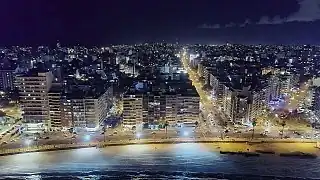 Pocitos at night
Pocitos at night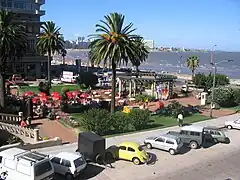 Gomensoro Square
Gomensoro Square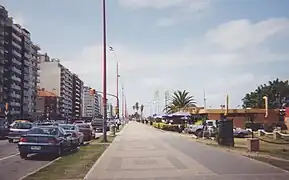 Apartment buildings and restaurants along the Rambla
Apartment buildings and restaurants along the Rambla
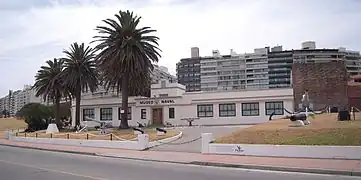
.jpg.webp) Spanish Embassy
Spanish Embassy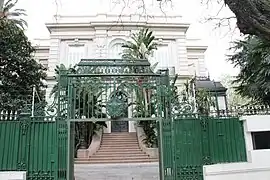 Brazilian Embassy
Brazilian Embassy
Educational facilities
- Colegio y Liceo Nuestra Señora de Fátima (private, Roman Catholic, Claretians)[21]
- German School of Montevideo (private, co-educational)
- Yavne School (private, co-educational, Jewish)
Places of worship
- Church of St. John the Baptist, popularly known as "Iglesia de Pocitos" (Roman Catholic)
- Church of Our Lady of Fatima (Roman Catholic, Claretians)
- Church of St. Alexander and St. Peter Claver (Roman Catholic)
- First Church of Christ, Scientist (Christian Science)
- Yavne[22] (Jewish)
- Beit Jabad[23] (Jewish-Chabad)
Further reading
- Assunção, Fernando O.; Bombet Franco, Iris (1991). Pocitos. Cuadernos del Boston (in Spanish). Vol. 4. Montevideo.
{{cite book}}: CS1 maint: location missing publisher (link)
References
- "Rambla de Pocitos". EL PAIS. 2019-02-13. Retrieved 2023-07-24.
- "Cae la última casa antigua sobre la rambla de Pocitos". EL PAIS. 2017-08-05. Retrieved 2023-07-24.
- "Barrio Pocitos | Municipio CH". 2022-07-02. Archived from the original on 2022-07-02. Retrieved 2023-07-24.
- "Lava la ropa, mulata". viajes.elpais.com.uy. Retrieved 2023-07-24.
- "El Pocitos de ayer". EL PAIS. 2020-10-15. Retrieved 2023-07-24.
- "60 años sin tranvías". EL PAIS. 2016-09-25. Retrieved 2023-07-24.
- "IM realizó limpieza en Playa pocitos y desenterró restos de antiguo hotel". Montevideo Portal (in Spanish). Retrieved 2023-07-24.
- "Limpian playa y aparecen restos del Hotel de los Pocitos". EL PAIS. 2015-07-28. Retrieved 2023-07-24.
- "La curiosa historia de la casa de Uruguay donde se marcó el primer gol en la historia de los Mundiales de fútbol". BBC News Mundo (in Spanish). Retrieved 2023-07-24.
- "PLAN ESPECIAL DE ORDENACIÓN, PROTECCIÓN Y MEJORA DE POCITOS - Intendencia de Montevideo" (PDF).
- Lapasta, Bernardo. "Estos son los barrios más caros de Montevideo para alquilar". El Observador. Retrieved 2023-07-24.
- Redacción (2022-07-24). "La Playa Pocitos: un ícono de la rambla montevideana". Grupo R Multimedio (in Spanish). Retrieved 2023-07-24.
- Redacción. "Por qué la IMM está removiendo arena en la zona del estadio de playa Pocitos". El Observador. Retrieved 2023-07-24.
- González, Rocío (2023-05-22). "Parque Rodó, 18 de Julio y la rambla de Pocitos: así se verían en 2050, según la inteligencia artificial". EL PAIS (in Spanish). Retrieved 2023-07-24.
- Trujillo, Valentín. "Habitar y gobernar". El Observador. Retrieved 2023-07-24.
- Trujillo, Valentín. "Habitar y gobernar". El Observador. Retrieved 2023-07-24.
- "Día del patrimonio 2021 - Universidad ORT Uruguay". 2023-01-05. Archived from the original on 2023-01-05. Retrieved 2023-07-24.
- "Resolución N° 399/986". www.impo.com.uy. Retrieved 2023-07-24.
- dice, C. E. García López (2017-04-10). "Restauran la histórica Casa Williman". Radiomundo En Perspectiva (in Spanish). Retrieved 2023-07-24.
- "MTOP realiza obras en la Escuela Brasil y presentó propuesta para atender 100 escuelas más". Government of Uruguay. February 27, 2012. Retrieved February 27, 2023.
- Colegio y Liceo Nuestra Señora de Fátima
- Yavne Archived 2013-02-17 at the Wayback Machine
- Beit Jabad
External links
- Intendencia de Montevideo / Useful data / Pocitos
- Intendencia de Montevideo / Historia de Pocitos
- Revista Raices / Historia del barrio Los Pocitos
- More information about POCITOS Barrio - GuiaDePocitos.com
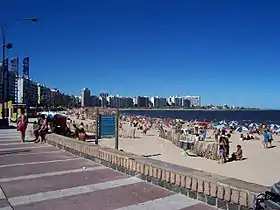
.jpg.webp)
